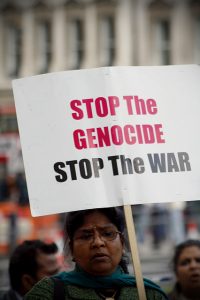
How do citizens of a country that has gone through a genocide remember and talk about that genocide? How does the survivor’s narrative about who is to blame about a genocide reflect the passage of time and the role of memory? To answer these questions, Hollie Nyseth Brehm and Nicole Fox analyze 102 interviews they conducted with Rwandan genocide survivors as they explore how collective memory is not only socially patterned, but how it also affects narratives on who is to blame for the violence.
Unlike previous studies that find survivors to be more likely to engage in “collective amnesia,” rarely referencing historical precedents leading to violence, survivors in Rwanda often volunteered historical explanations for the violence. Nyseth Brehm and Fox find little variation in the use of historical explanations across generational cohort, geographic location or educational attainment. They find that most of the interviewees mentioned at least one historical event as heralding the genocide, with many mentioning colonialism and the 1959 revolution as significant events. The 1959 revolution, especially, is mentioned by almost half the interviewees as being key in ushering a “bad government.”
By locating blame outside Rwanda by blaming colonialism, the international community, and international actors, Rwandans refute the notion that the genocide was due to enduring tribulations within Rwandan society. The authors argue that in post-conflict nations, placing blame on the international community and a “bad government” will have an effect on survivors’ political attitudes and their levels of engagement in reconciliation programs. One such effect may be large-scale support of minimal attempts by regimes to appear more effective than the “bad government” that came before them. Nyseth Brehm and Fox also suggest that in situations such as police violence in America or the refugee crisis in Europe, present day discussions on cultural traumas may transform over time and blame will be apportioned in new ways.

Comments